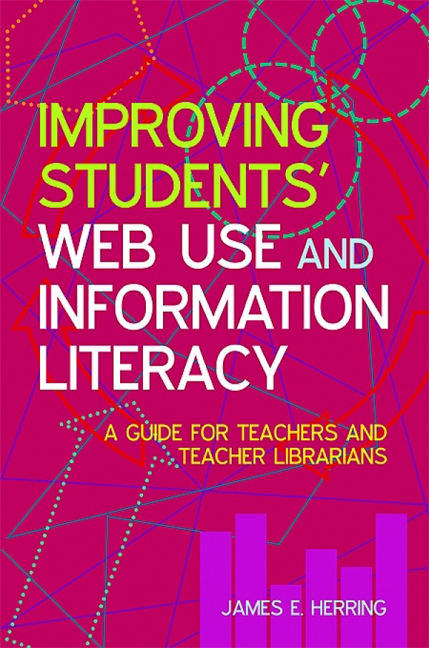Book contents
- Frontmatter
- Dedication
- Contents
- Acknowledgements
- Introduction
- 1 The big picture: learning and teaching in today's schools
- 2 Finding and using information on the web
- 3 Evaluating websites
- 4 Web 2.0 and schools
- 5 Information literacy
- 6 Improving student use of the web
- 7 Developing learning websites for student use - design and tools
- 8 Developing learning websites for student use - content
- 9 The next phase of ICT in schools
- Bibliography
- Index
5 - Information literacy
Published online by Cambridge University Press: 08 June 2018
- Frontmatter
- Dedication
- Contents
- Acknowledgements
- Introduction
- 1 The big picture: learning and teaching in today's schools
- 2 Finding and using information on the web
- 3 Evaluating websites
- 4 Web 2.0 and schools
- 5 Information literacy
- 6 Improving student use of the web
- 7 Developing learning websites for student use - design and tools
- 8 Developing learning websites for student use - content
- 9 The next phase of ICT in schools
- Bibliography
- Index
Summary
Introduction
Information literacy has been recognized as one of the key abilities which people in society should have for the 21st century. Because of the rapid expansion of technology and the ever growing amount of complex information (in a range of formats), which students, school staff and the general population need to review, select, evaluate and use effectively, information literacy is one of the fundamental aspects of education for today's students. As will be seen below, there is no agreed definition of information literacy, and aspects of information literacy in schools are often referred to, for example by teachers, as study skills, research skills, media literacy and digital literacy. The term ‘information literacy’ is now being used more widely than it was at the end of the 20th century and can be seen in reports in the areas of business, education and ICT in society.
There have been debates in recent years about the nature of school students, who are referred to by Prensky (2009) as digital natives, and the argument of Prensky and others is that because today's students have grown up with technology and digital information, they are innately better at finding and using information, particularly from the web. This is a very debatable view, given the anecdotal evidence from schools and research studies, which show that, although a minority of students may be effective web users, most students lack the essential skills and abilities in this area. While today's students may be excellent finders of information, they are often found to be ineffective at finding relevant information. The need to develop students who can understand, use and reflect on information literacy skills is a key challenge for teachers and teacher librarians.
This chapter will examine definitions of information literacy; evaluate information literacy models; discuss the issues relating to the transfer of information literacy skills and abilities; focus on collaboration between teachers and teacher librarians in teaching information literacy; and provide examples of in-service sessions for staff, which could be used in a primary or secondary school.
- Type
- Chapter
- Information
- Improving Students' Web Use and Information LiteracyA Guide for Teachers and Teacher Librarians, pp. 61 - 76Publisher: FacetPrint publication year: 2010



